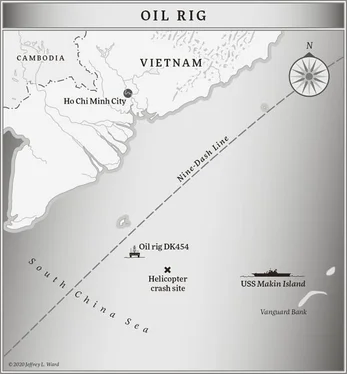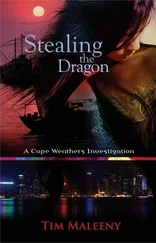Fu coughed, bringing sharp pains to life deep inside his skull. Seething fury blurred his vision. A steady flow of blood dripping off his brow said he probably had a concussion as well. Yang fared little better with a shattered leg and jaw.
Fu didn’t care how badly the man was hurt.
“Find me the phone!” The excruciating pain in his head made him gag when he shouted. He lowered his voice to a whispered hiss. “Now!”
The boat lay keeled over to port on her V-shaped hull, piling everyone and everything that wasn’t fastened down on the left. Yang found the phone under a pile of orange life vests.
Concentrating to stay awake, Fu telephoned the Burqin Airport, sixty kilometers to the south. He invoked the name of Admiral Zheng of People’s Liberation Army Naval Intelligence and demanded to speak to the XPCC 10th Division officer on duty. Fu was connected immediately and gave a hurried rundown of his urgent need to stop the escape of a valuable fugitive from the forest around Lake Kanas. The officer in charge, a youthful-sounding captain, was extremely cooperative but not especially helpful. Air assets this far north consisted of a handful of L-39 Czechoslovakian fighter jets for border patrols, and two helicopters, both of which were Harbin H425s, the civilian version of the Z-9W (or WZ-9) built in China for the PLA Air Force on a licensing agreement with Eurocopter. The colonel barked at a subordinate to get both birds in the air and then contact Xinjiang Corps Helicopter Brigade in Urumqi.
“But … the helicopters are generally used for search-and-rescue,” the captain said. “They are both equipped with infrared cameras, but no weapons.”
“That is fine,” Fu said, feeling as though he might pass out. “Just send them. These fugitives should not be difficult to find. Their boat will be visible somewhere on the north end of the lake.”
“Please excuse me.” The captain broke off the conversation to speak with someone else on his end.
“Major,” he said as he came back on the line. “A JY-14 radar station near our frontier with Kazakhstan and Russia reports numerous contacts less than ten kilometers across the border toward the Novosibirsk region of Russia. An unknown type of aircraft, but judging from the speed and varied course, they are believed to be rotary-wing.”
“The Russians …” Fu mused, too light-headed to think. “Why would the Russians be involved …?”
“Unknown, Major,” the captain said. “But considering your situation, it seemed connected. The Russian border is a mere twenty-six kilometers from Kanas Lake.”
“Yes,” Fu said. His left eye would not stay open, no matter what he did. “That makes sense.”
“Two of our L-39s will overfly you in approximately twenty minutes,” the captain said. “Perhaps they will discourage the Russian aircraft from making any incursions into China. I have already notified my superiors of your fugitives as well as the radar contacts. Very soon, you should have all the resources you need to make your capture.”
Fu leaned against the bulkhead, ending the call as he watched a steady trickle of blood drip from the driver’s ear where he lay draped over the wheel. The dead did not bleed, meaning the man was still alive. Fu took a deep breath, steadying himself. There was little he could do. He would need all his wits and strength when it came time to strangle every last person who had helped Medina Tohti lead him on this ridiculous chase.
61
SKS in hand, Chavez watched out the back window for ten full minutes after Ma’s last-second turn, fully expecting to see the larger boat appear at any moment.
The snow had abated to a few flakes here and there, but temperatures fell sharply, making Chavez wish he had a thicker hat.
Adam Yao ended another call out on deck, patting Chavez on the shoulder as he passed, coming in to get warm. His brow was furrowed, his jaw tense.
“Everything on track?” Chavez asked.
“All good,” Yao said, just like before, sounding as if he didn’t quite believe his own words. “They’re five minutes out.”
Medina gazed out the back window, an unfocused, thousand-yard stare. “Do you think they survived?”
“Wouldn’t surprise me if none of them made it,” Yao said. “A hard stop like that … It can be like falling off a roof.” He stuffed the sat phone in Chavez’s bag. Odd, but both were simple earth tone duffels. They were all running on fumes. It was an easy mistake to make—and Chavez didn’t mind carrying a few extra ounces of weight.
“I hope it killed them all,” Ma said. “For the sake of our people who remained behind.”
He reduced power again, this time referring to the moving chart on the electronic plotter as he scanned the shore.
Yao pointed with an open hand at the darkness beyond the glow of the running light. “There,” he said as a small cove materialized out of the black void. Two boulders the size of small cars guarded the entry to the cove, forcing him to hug the southern shoreline as he entered. Deadfall floated in the still water. Ma nosed the logs gently out of the way. The bank was relatively flat, rising gradually toward the tree line fifty meters away. Between water and trees lay a grassy meadow the size of a soccer field and braided with small streams flowing out of the Altay Mountains beyond.
Ma worked the twin Tohatsus in opposition, reversing the port engine while he nudged the starboard throttle forward, swinging the stern around so the starboard, or right side, of the vessel sidled up parallel to the shoreline.
Medina stood beside him as he worked, engaged in a deep and whispered conversation.
The others worked quickly, speaking little, grabbing what few bags they had and wrapping Lisanne in a blanket to get her ready for transport. They expected unfriendly company at any moment.
Even with Ma’s expert parking job, they were still ten feet from the mossy bank. Chavez and Ryan bailed off the boat into knee-deep water while Yao and Adara worked quickly to pass Lisanne, swaddled like a baby, over the side to them.
Out on deck now, Medina stormed to the far side of the deck, staring out at the water again. Her hushed conversation with Ma had apparently reached a boiling point.
A low hum, like the sound of a distant lawnmower, carried through the trees.
“We have to go,” Yao said. “Now.”
Medina wheeled, refusing to budge from her spot. “They will kill him if he does not come with us.”
“Ma?” Yao said, glancing to the Han man, who stood at the cabin door.
Ma gave a knowing nod. “They will see the boat. Someone needs to lead them away.”
It was hard to argue, but Chavez waved him on anyway. “We’re not even sure anyone’s coming after us since you took care of those last guys.”
“Oh,” Ma said. “You are a professional. You know they will come—and you know I must stay. Now take her and get off my boat.”
Medina shook her head, digging in. “I am not going.”
Ma went to her, taking her gently by the shoulders. “There is no time. I will take the boat north, away from here—”
Her head snapped up, the sorrow clearly visible even in the scant amber glow of the single lamp on deck. “We sink it!”
“No.” Ma shook his head. “They will surely spot it from the air. Someone must draw them away. I do not know what your secret is, but—”
“I do not know, either—”
“Whatever it is,” Ma said, “it is dangerous for Beijing—and that is good for us. You know this.”
Her chest shook, overcome with sobs. She nodded, unable to meet his eye.
“What will happen to the work?” she whispered. “The cause?”
Ma smiled softly. “I am not the only one,” he said, already steering her by the shoulders toward Yao and the shore. “We are nameless, but we are many.”
Читать дальше











![Александр Ирвин - Tom Clancy’s The Division 2. Фальшивый рассвет [litres]](/books/417744/aleksandr-irvin-tom-clancy-s-the-division-2-falsh-thumb.webp)
